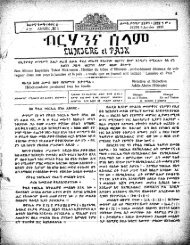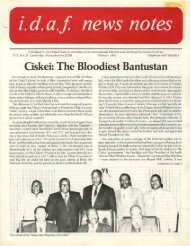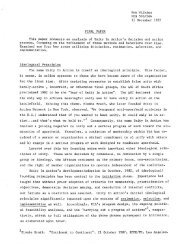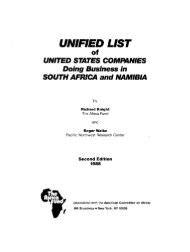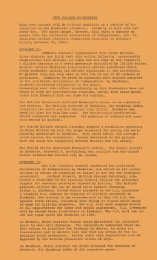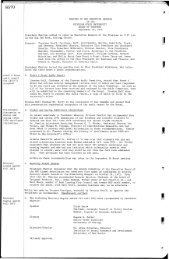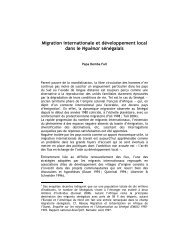Appendix - Matrix - Michigan State University
Appendix - Matrix - Michigan State University
Appendix - Matrix - Michigan State University
You also want an ePaper? Increase the reach of your titles
YUMPU automatically turns print PDFs into web optimized ePapers that Google loves.
professional baseball as a result of what Flood charges<br />
is "the treatment and handling of professional baseball<br />
players as if they were chattel or slaves." Flood is<br />
contesting the trading policy-common in most professional<br />
team sports-under which a player can be<br />
summarily sold or traded to another team by team<br />
owners and managers without so much as notifying<br />
him, much less inquiring about his feelings on the<br />
matter. Many a professional athlete has been shocked<br />
while casually reading his morning paper to discover<br />
that he has been traded to another team. His life is<br />
disrupted, his family is uprooted, his children are<br />
pulled out of school. Flood is fighting this master-slave<br />
relationship that exists between baseball owners and<br />
baseball players. I have heard more than a few professional<br />
athletes say that they hope he is successful.<br />
And they were not all baseball players. If Flood wins<br />
his case, the decision undoubtedly will set a precedent<br />
for other professional team sports. Little wonder that<br />
professional team owners and league presidents are<br />
squirming at the thought. For if Flood is successful, he<br />
will have pulled off the greatest victory for justice in<br />
pro athletics since another black man turned a similar<br />
trick in the late 40s when Jackie Robinson entered<br />
professional baseball.<br />
But regardless of how Flood's case turns out, the<br />
revolt has already led to changes in professional<br />
athletics, not the least of which is the hiring of black<br />
coaches. The latest of these black coaching appointments<br />
is Al Attles, new head coach of the San Francisco<br />
Warriors basketball team, and Alan Webb, coach<br />
of the minor-league Long Island Bulls. However, there<br />
are still no black head football coaches in big-league<br />
professional football or black managers in professional<br />
baseball. As Johnny Sample, former all-pro defensive<br />
safetyman for the 1968 Super-Bowl Champion New<br />
York Jets recently stated: "Racism is still rampant on<br />
FE? T<br />
Preface to the Paperback Edition • xx<br />
many professional football teams when it comes to the<br />
appointment of head coaches. For instance, Alex Webster<br />
was appointed head coach of the New York Giants<br />
after Allie Sherman was fired. Webster had been an assistant<br />
coach with the Giants only 2 years. Two black<br />
assistant coaches, Em Tunnell and Rosie Brown, both<br />
had longer coaching records and more impressive records<br />
as players with the Giants but Webster was chosen.<br />
The only reason that I can figure is that the latter two<br />
are black!" Frank Robinson has stated unequivocally<br />
that he wants to manage a professional team at the<br />
major league level. Thus far, no takers, although many<br />
managers and even some owners admit that he has the<br />
potential to be a great manager.<br />
So final victory in this struggle is by no means at<br />
hand. The sports establishment is a long way from<br />
bowing to all protests and demands. In an article published<br />
in the November, 1969, issue of Ramparts Magazine,<br />
Jack Scott, author of a widely read book en-.<br />
titled A thletics for A thletes, and I published an article<br />
exposing attempts by certain parties in the United<br />
<strong>State</strong>s to buy off black athletes. This was done in an<br />
attempt to insure that the Afro-American protests<br />
which racked the 1968 Olympics would not occur<br />
during the 1972 games. The attempt has failed miserably.<br />
Indications are that most black athletes have<br />
chosen dignity over money.<br />
The National Collegiate Athletic Association, one<br />
of the primary perpetuators of injustice in amateur<br />
athletics, has further hardened its line against changes<br />
in intercollegiate athletics. Not only has it passed and<br />
imposed on several occasions its rule of "manifest disobedience"<br />
(discussed in the text of this book) but<br />
it has sharpened its attack by sending out a monthly<br />
news letter. In the first such issue, which came out in<br />
January, 1970, the NCAA accused me of being in-<br />
Preface to the Paperback Edition • xxi



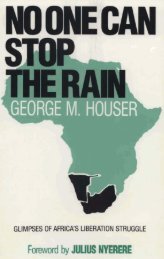



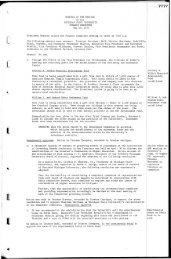
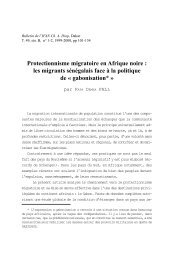

![Synthèse [6] DEFALL..INSTRAW.pdf - Matrix](https://img.yumpu.com/17880734/1/190x245/synthese-6-defallinstrawpdf-matrix.jpg?quality=85)
